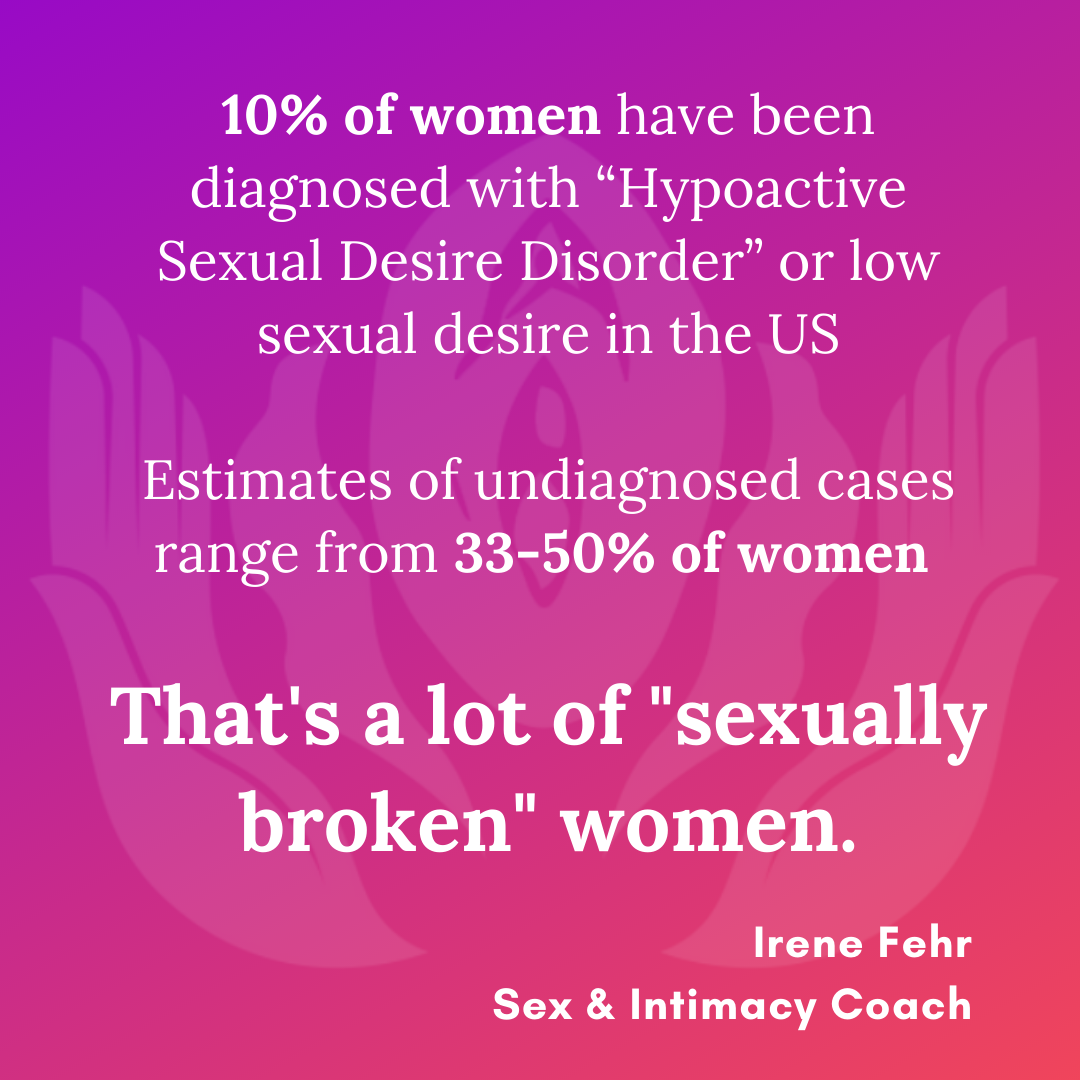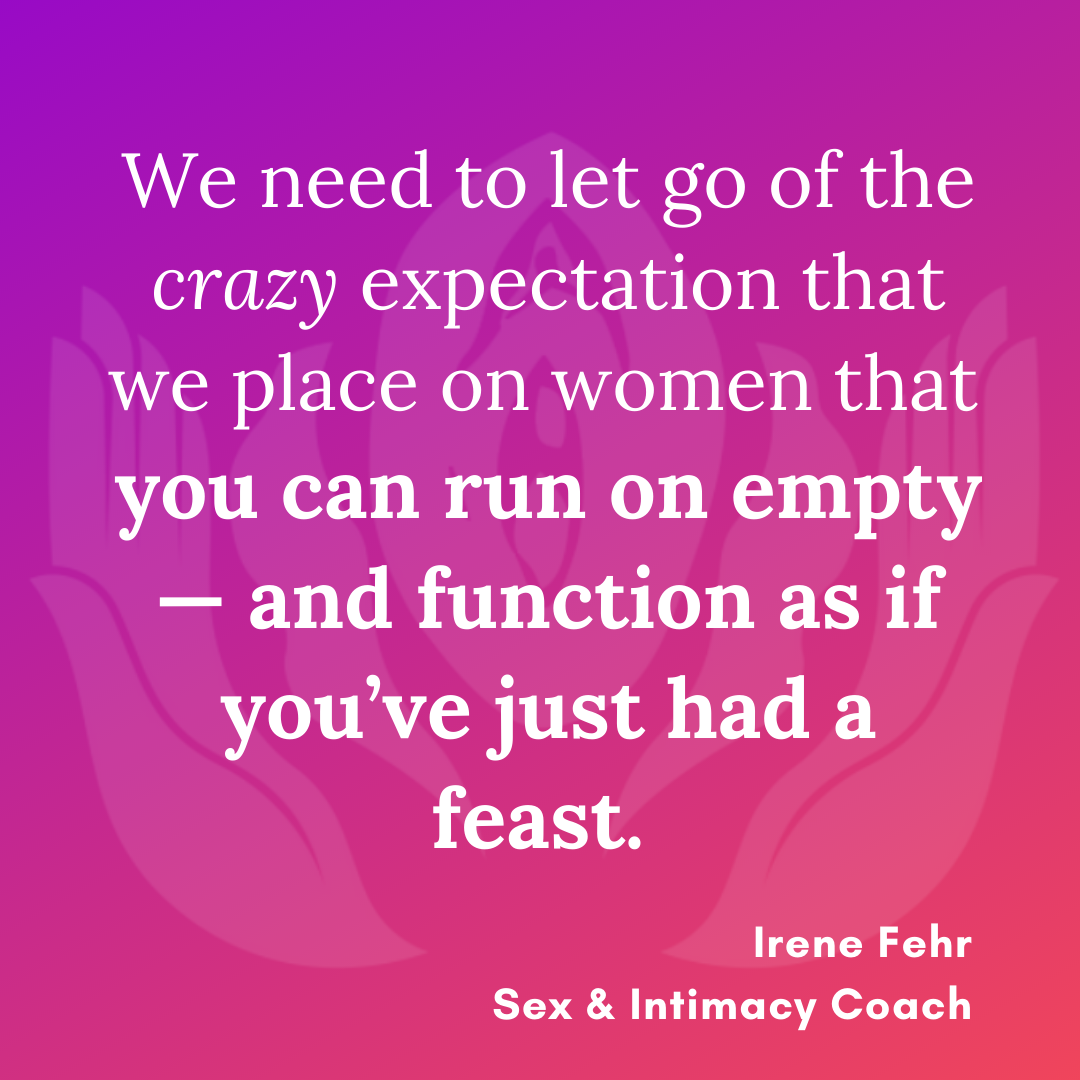A Letter to the “Sexually Broken” Woman
/Hello dear,
You are going through a lot right now, aren’t you?
Feeling so lost, so confused.
And alone.
You are scared of what your partner might say or do if you don’t want sex, yet again.
You’re scared of what it means for your relationship.
And you’re scared about what it means about you.
It is scary. It goes against the deepest wish you had for your relationship — to have that deep connection and sharing of love.
Yet alone you feel.
So alone.
Alone in working so hard to “get in the mood” and not being seen and acknowledged in how hard you’re trying. It doesn’t ever seem enough.
Everywhere you look, you see people holding hands and kissing, looking into each other's eyes — and you don’t get it. Why can’t you be more like these people, who are dripping sex on each other all day long?
Why is your libido broken?
And will you ever want to have sex again?
This is so hard.
I know, because I’ve been there, too.
I, too, had a sexless marriage. And it was my fault. I lost my libido and all desire for sex with my husband.
All I remember is …
The worry. The anxiety. The shame.
Feeling less of a woman, less of a partner.
And so powerless.
Without words to describe what you’re feeling, it’s hard to change things or ask for something. I had no words.
You and I are not alone.
In fact, you and I are among the millions of women who struggle with low libido.
Conservative estimates say that 10 percent of women have been diagnosed with “Hypoactive Sexual Desire Disorder,” or HSDD for short. That’s a whopping 15 million women in the US alone.(1)
Further research suggests the condition is under-diagnosed and affects closer to 33 percent of women, according to Heather L. Beall, MD, a gynecologist at Northwestern Medicine McHenry Hospital.(2)
And yet another recent survey supported by HealthyWomen and Palatin Technologies, Inc. [who are developing an on-demand treatment for HSDD], nearly half of premenopausal women (ages 30-50) say they've experienced low sexual desire at some point in their lives (3)
That’s hundreds of millions of women who struggle silently with low libido, who won’t reach out for help, or who just lay there and bear it “for the relationship.”
This under-reported and under-recognized phenomenon that no one seems to talk about takes a real toll on women's romantic relationships and self-esteem.
If you’re diagnosed with HSDD, the pain extends into mental health and the health of the relationship: (4,5)
92% of women feel they’re letting their partner down
71% of women feel hopeless
71% of women feel less connected to their partner
When I saw these numbers, I felt relief … as you might be feeling right now.
“I am not alone!” I cried out through my tears.
First, I found these numbers comforting.
Then, they made me angry. Very angry!
And they should make you angry, too!
That’s a lot of “sexually broken” women.
Women with half-dead libidos.
Women who cannot enjoy sex.
Women who blame themselves for the demise of the relationship.
That’s almost half of the female population of the US, to be precise.
Low libido is the most common female sexual dysfunction in women — in addition to painful sex.
And there’s another staggering statistic I must share. According to the American College of Obstetricians and Gynecologists, as many as 75% of women will experience pain during sex at some point.
Seventy five percent!
That’s a lot of “sexually broken” women.
And that had me realize …
What if we’re looking at this all wrong?
What we consider a sexual dysfunction in women is just the way women work. And why do we call it sexual dysfunction?
Because we’re comparing women to men as if his sexuality is the gold standard, “how it should be,” the norm.
We have been socialized to look at it this way for hundreds of years, and the medical and psychological models reflect that thinking too.
Compared to men, women look broken.
With men’s spontaneous sexual desire, they have desire readily available to them, in their back pocket.
Women’s sexual desire is responsive — to the environment, to her emotional state, to the levels of stress, to a sense of safety and privacy in that moment and to many other things. Her sexual desire needs to be cultivated and awakened.
But it’s not only that women will look “sexually broken.”
It’s that comparing her to men makes her feel inferior, broken and hopeless — and these are not sexy.
And feeling inferior and broken is guaranteed to make her libido and sexual desire go down.
More than that, it disempowers her to speak up and stand up for what she needs.
It disempowers her to change anything.
And it makes “bearing it for the relationship” the inevitable outcome.
……..
When I started to open up about my own story of my loss of libido and a sexless marriage — and the agony that came with it — hundreds of women poured their hearts out to me.
Women’s libido in a long-term relationship became the center of my coaching practice: to support women to reconnect to their own sexual desire — and to help couples find their way back to each other.
I knew there was hope, because I was able to reclaim my own libido. But that was the beginning. What I found out by working with hundreds of women was just how much women are struggle with the same issues.
On the surface, it looks like
Women don’t have low libido.
They aren’t excited to have sex.
They can’t get aroused.
They’re not interested in sex with their partners.
But take a look under the hood.
These women are also struggling with:
The “superwoman syndrome:” exhausted mothers having to handle a full-time job, kids, household chores and pets (and a pandemic) — and expecting themselves to be turned on when they crawl into bed exhausted
New mothers’ exhaustion and being over-touched and not knowing how to take care of themselves or convey to their partners what is happening
Getting five minutes of her partner’s time to fondle her breasts to get her “ready for sex” before he inserts himself into her (or he pouts that’s frigid) and not getting any pleasurable touch for her
Never having been touched sensually, never having felt a moment where they were at the center of their partner’s attention
Having sex at 20% of possible physical arousal and wondering what is wrong with them for having pain during penetration (that’s the equivalent of having getting dental work at only 20% anesthetic)
Feeling anxious to take their time to really enjoy pleasure focused on them, fearing inconveniencing the man for “taking too long” and appearing less than the “porn ideal,” and having sex too early
Seeing their partners in passing all week long, barely exchanging a word, then expecting themselves to have sex just because they love their partners
Working so hard to orgasm for him, using up all her energy to be sexual on his timeline, exhausting herself
Having penetration for three minutes that it takes a man to orgasm and then it’s “game over” for her
Not knowing what is happening to her pregnant and post-pregnancy changing body and feeling pleasure to go back to “the way it was”
Struggling with shifts to her sexuality and body in peri- and post- menopause while her husband wants sex to continue as it was before
The is one thing in common among these women?
They’re healthy, and they're starving.
Healthy because their responsive sexual desire is responding to a lack of nutrients.
Starving because they’re missing
Physical pleasure that’s for them — on their terms, for their body
Exquisite attention and time spent on their bodies — their bodies being pleasured and adored, worshipped even
A sense of inner peace that you have when you know how your own body works
Being understood and believed when they express what is going on for them
Having real information about the way their own sexuality works
When a woman feels sexually broken, she is less likely to feed herself.
She is less likely to take care of herself and her body.
She is less likely to advocate on behalf of her pleasure — or her needs.
And all of these further kill her libido.
…………
Now, coming back to you, my dear woman reading this article …
If you resonate with any or all of these “other” symptoms, this is what I want to tell you:
You Cannot Have a Libido and Be Starving
The reality is that you cannot experience aliveness and life force in your body (aka libido) and be starving at the same time.
You have to let go of the crazy idea that you can run on empty — and function as if you’ve just had a feast.
The list of missing nutrients that would have you want sex will be individual to you, but it must include one crucial element — having the experience of sex that’s worth wanting.
Sex that works and honors your body and pace.
Sex that emerges out of attention and connection from your partner that honors you and makes you feel cherished and adored.
Sex that builds from a sensual journey that awakens your body and lets you come alive.
Sex that progresses in a way that has you feel excited to continue and have more.
And sex that is not burden by guilt or obligation, but comes from your desire.
Now, I know it’s not your fault if your libido is not as you’d want it to be.
It’s not your fault that our society has glorified “running on empty” and made a sacrificial animal out of you.
And it’s not your fault that you have not been taught how to feed yourself.
But knowing this, you now have the responsibility to get the nutrients you need and fill your cup.
Not for your partner or to make your sex life better.
Not even to able to enjoy sex (because it’s ok to not want to).
But for yourself. So that you can come alive.
In service of your sexual pleasure and wellness,
P.S. Resonated with this article? Write your comments below and share this article with other women & men who need to hear this!
#WeAreNotBroken
#FeedYourLibido
References:
1. U.S. Census Bureau, 2014; Shifren JL, Monz BU, Russo PA, et al. Sexual problems and distress in United States women: prevalence and correlates. Obstet Gynecol. 2008;112(5):970-8.
2. Quoted in https://www.thehealthy.com/sex/hypoactive-sexual-desire-disorder/
3. Quoted in https://www.healthywomen.org/content/article/whats-really-causing-your-low-sex-drive
4. Kingsberg SA. Attitudinal survey of women living with low sexual desire. J Women’s Health. 2014; 23(10):817-23.
5. Leiblum SR, Koochaki PE, Rodenberg CA, Barton IP, Rosen RC. Hypoactive sexual desire disorder in postmenopausal women: US results from the Women’s International Study of Health and Sexuality (WISHeS). Menopause. 2006; 13(1):46‐56.
P.S. When you’re ready for more, here are a few options for you.
SCHEDULE a consultation for you and your partner for individualized support
ENROLL in my signature step-by-step FEED YOUR LIBIDO process to learn to know what you need, how to voice that, and what to do to connect to your partner





